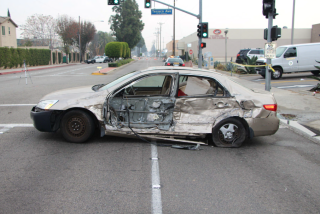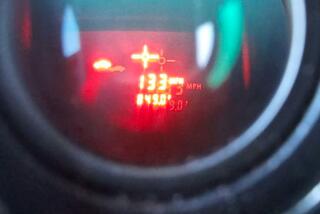Norwalk’s Error Voids 505 Speeding Tickets
- Share via
NORWALK — Druggist Jay Harrison was taking his brand new 1985 Nissan Maxima out for a test drive in October when he passed a county sheriff’s patrol car parked off Firestone Boulevard.
“This guy was hiding in the shadows,” Harrison recalled. “The next thing I know he flashed his lights and pulled me over. He said he picked me up on his radar doing 52 (m.p.h. in a 35-m.p.h. zone). I said I didn’t think I was going that fast.”
A likely story perhaps, told many times by many motorists.
Hundreds Off the Hook
Except this time, Harrison, with the help of his friend, Ed White, not only went to court and beat the speeding ticket but also got hundreds of other accused speeders off the hook as well.
White, doing research in a law library in October, found radar-clocked speeding tickets are void in Norwalk because the city does not have up-to-date surveys of the average speeds driven on local streets, as required by state law. After a series of meetings, officials from the City of Norwalk and Downey Municipal Court on Friday conceded the point, agreeing to dismiss 505 radar-clocked speeding tickets issued since September, including Harrison’s. Motorists will get back some $12,700 in fines, court costs and driving school fees.
The reprieve also extends to 20 persons who were sought on arrest warrants for not answering their tickets. No one had been arrested after receiving one of the since-dismissed tickets, city officials said.
Deputy Dist. Atty. Peter Bozanich said the tickets were illegal because state law requires that posted speed limits be supported by traffic surveys done within the past five years. The majority of the city’s traffic surveys were done in September, 1979.
Surveys Required
Such surveys must show that the posted speed limit is a speed driven by 85% of passing motorists. Without the required surveys, the use of radar patrols constitutes an illegal “speed trap,” Bozanich said.
“There was a mistake made by City Hall,” conceded Mayor Cecil Green.
Such a mistake by municipal officials is “rare,” Bozanich said, adding that he could not recall another such incident.
City Engineer and Public Works Director Ken Montgomery said city officials were aware of the law, but that the traffic surveys were postponed because officials were busy designing plans for a $1.9-million expansion of City Hall and city maintenance facilities, which will be put out to bid next month.
The city began the required surveys in November, and more than half have since been completed, said city Traffic Engineer Carmen Gendusa. As the surveys are completed, the city is informing the Sheriff’s Department which streets are eligible for radar patrols again, Gendusa said. Officials declined to say which streets have been surveyed.
White and Harrison said they are pleased with the city’s decision to refund the fines.
All 505 persons who received radar-clocked speeding tickets from the Sheriff’s Department between Sept. 17 and Dec. 6 will soon receive letters from the city, City Atty. Ken Brown said. The letters will say that refunds will be made by the courts and the city, and that all speeding violations will be removed from motorists’ driving records, Brown said.
279 Have Paid Fines
Since the tickets were issued, 279 persons have already paid fines of an average of $40, or $11,160, Gendusa said. Another 124 persons have paid $10 each in court costs, or $1,240, and signed up to attend traffic school, while 15 persons already have attended traffic school at an additional cost of $20 to $25 each, or a total of $300 to $375. All court costs will be refunded by the courts and traffic school fees will be refunded by the city, Gendusa and Brown said.
The remaining tickets for future court appearances have been dismissed, Gendusa said. In cleaning up the city’s mistake, two clerks at the municipal court have spent two full days going through computer records to identify all 505 ticket holders, Gendusa said.
The refunds have cost the city more than $5,500 to date, because approximately $20 from every $40 speeding fine goes to the city, officials said. But City Atty. Brown said that officials decided to refund the money because “it seemed like the right thing to do.”
Began Investigating
White, 62, who has challenged city and law enforcement officials often in the past, said he began his investigation of the speeding tickets after Harrison told him about his ticket in late October during a conversation in Harrison’s drugstore in Norwalk.
White said he wondered why the posted speed limit was 35 m.p.h. on the eastern end of Firestone Boulevard when the limit was 40 m.p.h. on the western end of the same street. White said he visited City Hall to find out how city officials justified the speed limit and noticed the traffic survey for Firestone Boulevard was dated Sept. 17, 1979.
After a week’s research, White, who owns a Norwalk insurance agency, brought the discrepancy to the attention of the Sheriff’s Department and Judge Reynaldo Chaparro of the Downey Municipal Court.
More to Read
Sign up for Essential California
The most important California stories and recommendations in your inbox every morning.
You may occasionally receive promotional content from the Los Angeles Times.













